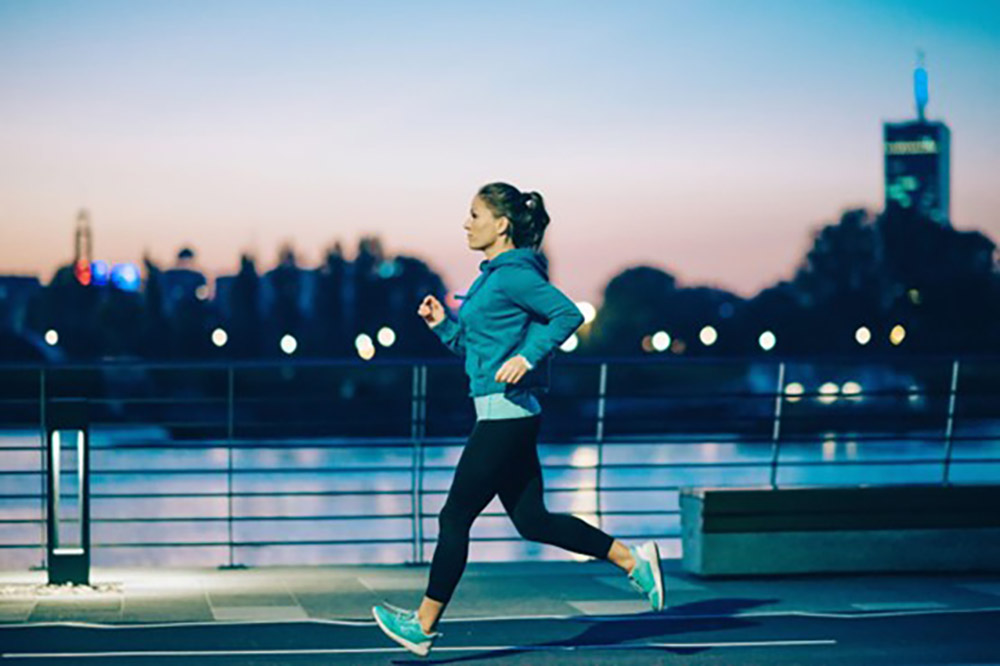
你更傾向于晨起鍛煉以迎接新一天,,還是選擇下班后前往健身房,借運(yùn)動緩解一天的壓力,?于個人偏好的時段進(jìn)行鍛煉堪稱理想之選,,尤其是鍛煉能帶來諸多益處,從降低罹患結(jié)直腸癌的風(fēng)險到延長壽命,。達(dá)到每周建議的150分鐘運(yùn)動量,,還能助力降低罹患200多種疾病的風(fēng)險。
不過,,對于那些習(xí)慣在一天結(jié)束時進(jìn)行鍛煉的人群來說,,此類鍛煉很可能會對健康的另一關(guān)鍵層面——睡眠質(zhì)量,造成不良影響,。
4月15日發(fā)表在《自然·通訊》(Nature Communications)上的一項新研究的主要作者伊莉斯·法瑟-蔡爾茲(Elise Facer-Childs)表示:“夜間開展鍛煉活動,,特別是那些需要承擔(dān)較高水平心血管負(fù)荷的鍛煉活動,很可能會對后續(xù)的睡眠,、靜息心率以及心率變異性產(chǎn)生干擾,,進(jìn)而損害身體恢復(fù)過程中的關(guān)鍵環(huán)節(jié)?!?
澳大利亞墨爾本莫納什大學(xué)(Monash University)的研究人員發(fā)現(xiàn),,在睡前四小時內(nèi)開展鍛煉活動,,與入睡時間延遲、睡眠時長縮短,、睡眠質(zhì)量下降以及靜息心率升高和心率變異性(即每次心跳之間的間隔時長)下降存在關(guān)聯(lián),。尤其在進(jìn)行諸如高強(qiáng)度間歇訓(xùn)練、足球比賽或長跑等夜間高強(qiáng)度鍛煉時,,這些影響表現(xiàn)得更為顯著,。
研究人員對14689名來自不同國家的人員展開調(diào)查,通過為期一年的持續(xù)監(jiān)測,,收集到高達(dá)400萬個夜間數(shù)據(jù),。參與者均佩戴健身監(jiān)測設(shè)備(WHOOP運(yùn)動手環(huán)),用以記錄運(yùn)動,、睡眠及心血管方面的數(shù)據(jù),。
睡眠與鍛煉之間的關(guān)系
過往研究顯示,鍛煉能夠改善睡眠質(zhì)量,,甚至有助于治療失眠等睡眠障礙,。今年早些時候開展的一項研究闡釋道,鍛煉不僅有助于加快入睡速度,,還能促進(jìn)褪黑素(負(fù)責(zé)調(diào)節(jié)睡眠周期的激素)的分泌,。
雖然有部分研究表明夜間鍛煉不會對睡眠產(chǎn)生干擾,但該研究的作者指出,,此前的研究結(jié)論缺乏足夠的確定性,。
該研究的合著者喬希·萊奧塔(Josh Leota)表示:“此類研究往往依賴于有限的樣本規(guī)模以及實(shí)驗(yàn)室環(huán)境,,并且很少涵蓋那些會對身體造成大量心臟代謝負(fù)荷的鍛煉活動,,這使得此類研究結(jié)果的外部有效性受到質(zhì)疑?!?/p>
他補(bǔ)充道:“夜間進(jìn)行劇烈運(yùn)動會使身體處于高度警覺狀態(tài),,這也是公共衛(wèi)生指南先前一直建議避免在臨近就寢時段進(jìn)行鍛煉的原因所在?!?/p>
睡眠在助力體能恢復(fù)方面發(fā)揮著舉足輕重的作用,,它不僅能讓你為下一次鍛煉做好更充分的準(zhǔn)備,還可降低受傷風(fēng)險并提升運(yùn)動表現(xiàn),。關(guān)于睡眠和運(yùn)動表現(xiàn)的研究發(fā)現(xiàn),,睡眠質(zhì)量欠佳會導(dǎo)致肌肉力量與耐力減弱,同時增加受傷風(fēng)險并延緩傷勢痊愈進(jìn)程,。
睡眠欠佳與大腦老化進(jìn)程加速,、認(rèn)知功能衰退、心理健康狀況惡化以及免疫系統(tǒng)功能抑制存在關(guān)聯(lián)。
研究人員還發(fā)現(xiàn),,臨近就寢時間進(jìn)行鍛煉的人群心率變異性較低,,這與壽命縮短、肥胖問題,、心血管疾病,、炎癥反應(yīng)、心理健康狀況不佳以及免疫功能下降存在關(guān)聯(lián),。他們還注意到,,夜間鍛煉者的靜息心率偏高,這意味著心臟必須付出更多努力才能將血液輸送至身體其他部位,,即心臟的工作效率相對較低。美國心臟協(xié)會(American Heart Association)指出,,靜息心率偏高與體重超標(biāo),、血壓升高以及身體素質(zhì)下降存在關(guān)聯(lián)。
萊奧塔表示,,這項新研究的結(jié)果表明,,如果人們想要改善睡眠健康狀況,那么至少在睡前四小時進(jìn)行鍛煉或許有所助益,。
或者,,他說:“倘若在睡前四小時內(nèi)進(jìn)行鍛煉,人們不妨選擇時間較短,、強(qiáng)度較低的運(yùn)動項目,,比如慢跑或游泳,以盡量減少對睡眠的干擾,,并讓身體逐漸放松下來,。”(財富中文網(wǎng))
譯者:中慧言-王芳
你更傾向于晨起鍛煉以迎接新一天,,還是選擇下班后前往健身房,,借運(yùn)動緩解一天的壓力?于個人偏好的時段進(jìn)行鍛煉堪稱理想之選,,尤其是鍛煉能帶來諸多益處,,從降低罹患結(jié)直腸癌的風(fēng)險到延長壽命。達(dá)到每周建議的150分鐘運(yùn)動量,,還能助力降低罹患200多種疾病的風(fēng)險,。
不過,對于那些習(xí)慣在一天結(jié)束時進(jìn)行鍛煉的人群來說,,此類鍛煉很可能會對健康的另一關(guān)鍵層面——睡眠質(zhì)量,,造成不良影響。
4月15日發(fā)表在《自然·通訊》(Nature Communications)上的一項新研究的主要作者伊莉斯·法瑟-蔡爾茲(Elise Facer-Childs)表示:“夜間開展鍛煉活動,特別是那些需要承擔(dān)較高水平心血管負(fù)荷的鍛煉活動,,很可能會對后續(xù)的睡眠,、靜息心率以及心率變異性產(chǎn)生干擾,進(jìn)而損害身體恢復(fù)過程中的關(guān)鍵環(huán)節(jié),?!?
澳大利亞墨爾本莫納什大學(xué)(Monash University)的研究人員發(fā)現(xiàn),在睡前四小時內(nèi)開展鍛煉活動,,與入睡時間延遲,、睡眠時長縮短、睡眠質(zhì)量下降以及靜息心率升高和心率變異性(即每次心跳之間的間隔時長)下降存在關(guān)聯(lián),。尤其在進(jìn)行諸如高強(qiáng)度間歇訓(xùn)練,、足球比賽或長跑等夜間高強(qiáng)度鍛煉時,這些影響表現(xiàn)得更為顯著,。
研究人員對14689名來自不同國家的人員展開調(diào)查,,通過為期一年的持續(xù)監(jiān)測,收集到高達(dá)400萬個夜間數(shù)據(jù),。參與者均佩戴健身監(jiān)測設(shè)備(WHOOP運(yùn)動手環(huán)),,用以記錄運(yùn)動、睡眠及心血管方面的數(shù)據(jù),。
睡眠與鍛煉之間的關(guān)系
過往研究顯示,,鍛煉能夠改善睡眠質(zhì)量,甚至有助于治療失眠等睡眠障礙,。今年早些時候開展的一項研究闡釋道,,鍛煉不僅有助于加快入睡速度,還能促進(jìn)褪黑素(負(fù)責(zé)調(diào)節(jié)睡眠周期的激素)的分泌,。
雖然有部分研究表明夜間鍛煉不會對睡眠產(chǎn)生干擾,,但該研究的作者指出,此前的研究結(jié)論缺乏足夠的確定性,。
該研究的合著者喬?!とR奧塔(Josh Leota)表示:“此類研究往往依賴于有限的樣本規(guī)模以及實(shí)驗(yàn)室環(huán)境,并且很少涵蓋那些會對身體造成大量心臟代謝負(fù)荷的鍛煉活動,,這使得此類研究結(jié)果的外部有效性受到質(zhì)疑,。”
他補(bǔ)充道:“夜間進(jìn)行劇烈運(yùn)動會使身體處于高度警覺狀態(tài),,這也是公共衛(wèi)生指南先前一直建議避免在臨近就寢時段進(jìn)行鍛煉的原因所在,。”
睡眠在助力體能恢復(fù)方面發(fā)揮著舉足輕重的作用,,它不僅能讓你為下一次鍛煉做好更充分的準(zhǔn)備,,還可降低受傷風(fēng)險并提升運(yùn)動表現(xiàn),。關(guān)于睡眠和運(yùn)動表現(xiàn)的研究發(fā)現(xiàn),睡眠質(zhì)量欠佳會導(dǎo)致肌肉力量與耐力減弱,,同時增加受傷風(fēng)險并延緩傷勢痊愈進(jìn)程,。
睡眠欠佳與大腦老化進(jìn)程加速、認(rèn)知功能衰退,、心理健康狀況惡化以及免疫系統(tǒng)功能抑制存在關(guān)聯(lián),。
研究人員還發(fā)現(xiàn),臨近就寢時間進(jìn)行鍛煉的人群心率變異性較低,,這與壽命縮短,、肥胖問題、心血管疾病,、炎癥反應(yīng),、心理健康狀況不佳以及免疫功能下降存在關(guān)聯(lián)。他們還注意到,,夜間鍛煉者的靜息心率偏高,,這意味著心臟必須付出更多努力才能將血液輸送至身體其他部位,即心臟的工作效率相對較低,。美國心臟協(xié)會(American Heart Association)指出,靜息心率偏高與體重超標(biāo),、血壓升高以及身體素質(zhì)下降存在關(guān)聯(lián),。
萊奧塔表示,這項新研究的結(jié)果表明,,如果人們想要改善睡眠健康狀況,,那么至少在睡前四小時進(jìn)行鍛煉或許有所助益。
或者,,他說:“倘若在睡前四小時內(nèi)進(jìn)行鍛煉,,人們不妨選擇時間較短、強(qiáng)度較低的運(yùn)動項目,,比如慢跑或游泳,,以盡量減少對睡眠的干擾,并讓身體逐漸放松下來,?!保ㄘ敻恢形木W(wǎng))
譯者:中慧言-王芳
Do you prefer waking up early to start your day with a workout, or relieving the day’s stress by hitting the gym after work? Fitting in exercise when you like is ideal, especially with the numerous benefits that working out can have, from lowering colorectal cancer risk to extending your lifespan. Getting in the recommended 150 minutes of exercise per week can also help lower your risk of over 200 diseases.
But for end-of-day exercisers, those workouts could be impacting another crucial part of your health: sleep quality.
“Evening exercise—particularly involving high levels of cardiovascular strain—may disrupt subsequent sleep, resting heart rate, and heart rate variability, thereby impairing a critical stage of the recovery process,” said Elise Facer-Childs, lead author of a new study that was published on Apr. 15 in Nature Communications.
The study’s researchers, out of Monash University in Melbourne, Australia found that exercising within four hours before bedtime was linked to falling asleep later, getting less and worse quality sleep, and having a higher resting heart rate and lower heart rate variability (the time gaps between each heartbeat). The findings were especially pronounced for higher intensity workouts in the evening, like HIIT (high-intensity interval training), a soccer game, or a long run.
Researchers looked at an international cohort of 14,689 people monitored across one year resulting in four million nights of data. Participants wore a fitness monitor (WHOOP Strap) to record exercise, sleep, and cardiovascular data.
The relationship between sleep and exercise
Previous research has found that exercise improves sleep quality, and could even help remedy sleep disorders like insomnia. A study from earlier this year explained that exercise boosts melatonin production, the hormone responsible for regulating sleep cycles, in addition to helping you fall asleep faster.
While some research indicates that evening exercise does not interfere with sleep at all, the authors of this study point out that previous findings were less conclusive.
“These studies have relied on small sample sizes and laboratory settings, and rarely involved exercise bouts that elicit substantial cardiometabolic demand on the body, calling into question the external validity of such findings,” said co-author Josh Leota.
“Intense exercise in the evening can keep the body in a heightened state of alertness, which is why public health guidelines have previously advised against working out too close to bedtime,” he added.
Sleep also plays a vital role in helping you recover better not only for your next workout, but also to stave off injury risk and improve workout performance. Research on sleep and athletic performance has found that poor quality sleep can impair muscle strength and endurance, while increasing risk of injury and inhibiting injury recovery.
Poor sleep is tied to faster brain aging, decreased cognitive functioning, worsened mental health, and a suppressed immune system.
Researchers also observed a lower heart rate variability among people who exercised close to sleeping, which has been linked with shorter lifespan, obesity, cardiovascular disease, inflammation, poor mental health, and worsened immune health. They also noticed evening exercisers had a higher resting heart rate, which indicates your heart has to work harder to pump blood to the rest of your body—meaning it is less efficient. High resting heart rate is associated with higher body weight, higher blood pressure, and lower physical fitness, according to the American Heart Association.
Leota said the new study’s findings suggested that if people were aiming to improve sleep health, they may benefit from working out at least four hours before going to bed.
Or, he said, “If exercising within a four-hour window of bedtime, people could choose brief low intensity exercises, such as a light jog or swim, to minimize sleep disruption and allow the body to wind down.”






